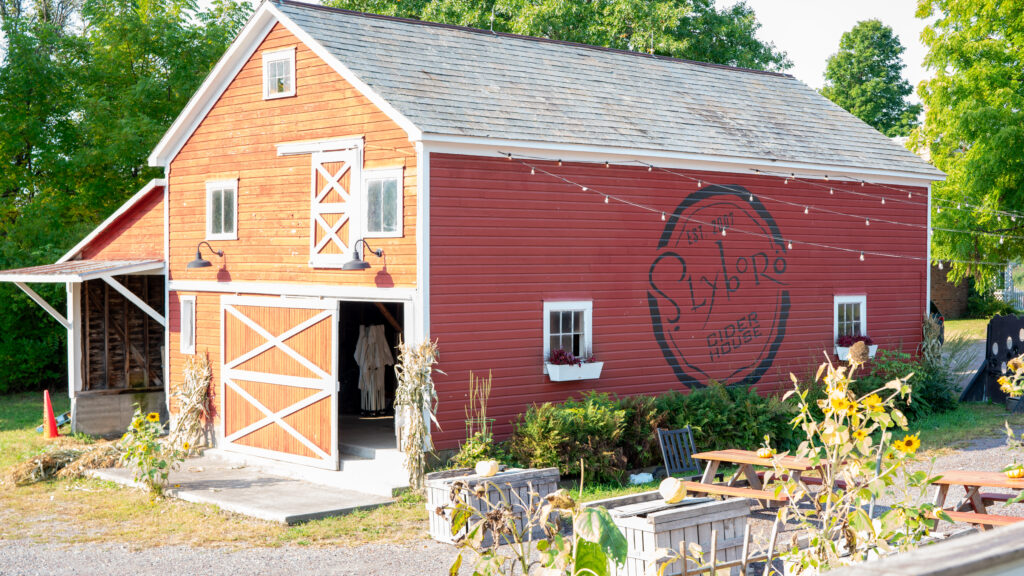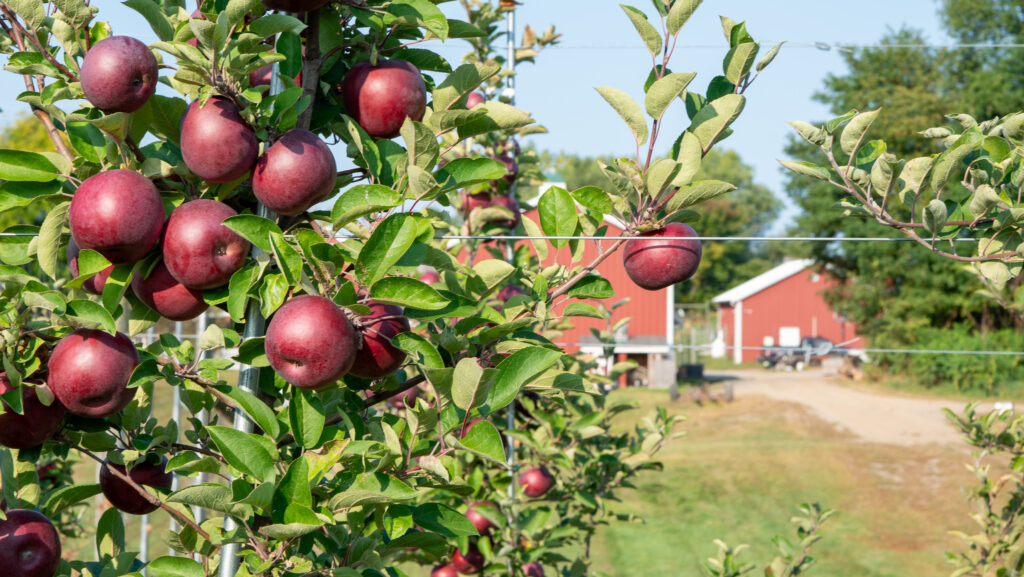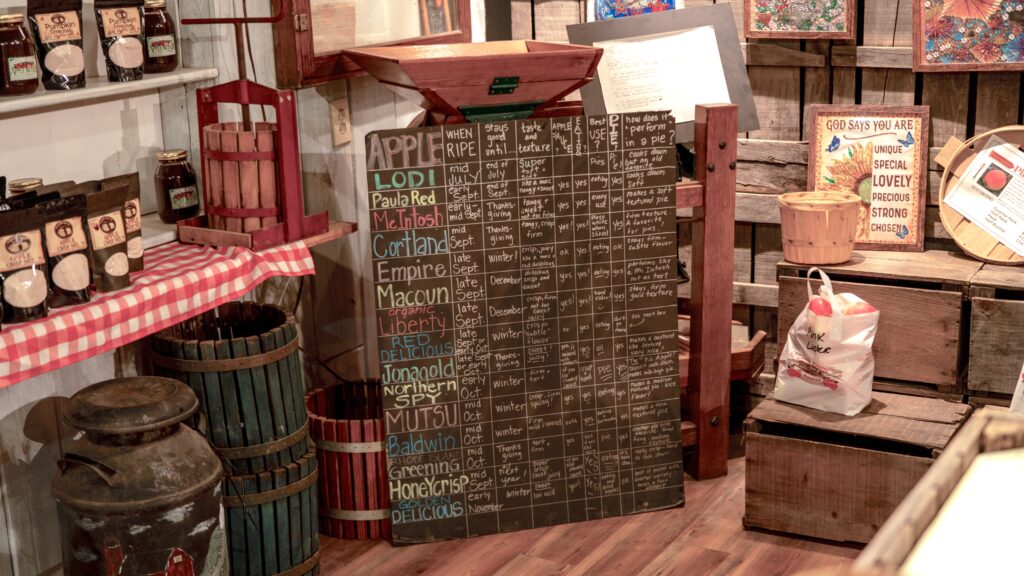Variety is the Spice of Life
A farm survival guide for perilous times

By: Megin Potter
Photos by Michael Nelson
The last century has focused on controlling and streamlining food systems. The result? Today, fewer farms, producing higher yields, and earning increased profits.

Shifting production away from small farms nurturing natural, complex ecosystems however, has come at a cost. The lack of diversification makes the whole system vulnerable to problems.
Fifty years ago, in the fall of 1974, Dan Wilson was just entering his freshman year at Granville Central School. His family had just purchased a 350-acre farm in Upstate New York, and moving here was a bit of a shock, he said.
“It felt exciting, adventurous. My dad was a corporate executive, so it was a complete change of pace for us.”
Before moving to Washington County, Dan’s family lived in Southern Connecticut and his dad was the head of Research and Development at industry giant, General Foods Corporation.
The farm’s previous owners, the Hicks family, were very welcoming however, and had already established a successful U-pick farm on the property (the oldest of its kind in New York State).
Surviving Unpredictable Circumstances
In the 119 years that Hicks Orchard has been providing families with the opportunity to pick their own produce, they have learned how to capitalize on diversity.
“Northern Washington County is hilly, so you have these very small farms, and the only way for them to survive is to do something unique by creating value-added products and processes that create a brand experience. That’s the way to ensure the survivability of small farms,” said Dan.
Since he began running Hicks Orchard in 1990, it has attracted an average of 30,000 people annually, primarily from late summer to early November.
Sometimes, that season is even shorter, like last year, when a late spring freeze resulted in Hicks Orchard losing 60% of their apple crop.

Keeping it Fresh
To survive, farming, like other industries, must weather recessions, pandemics, and a changing climate. Agritourism across the country has experienced significant revenue growth in the last 30 years, but relies on luring urbanites and families out to the country for a wholesome experience.
When there’s no pickable produce or unpleasant weather, agritourists might not make the trek out to the farm at all. Unlike other types of farming, the you-pick model includes the added costs of risk management, insurance, and providing customer comfort. Which is why one of the first things Dan did was convert the farm’s bakery building into public restrooms.
As the old packing barn grew into a vibrant, year-round farm store, the farm hosted numerous parties and a variety of events. In addition to being a farmer preparing for future shocks and stressors, Dan is also akin to a stage manager creating a platform for people to have a memorable experience.
Expanding Off-Site
To help insulate Hicks Orchard from the variability of the weather, they began making apple cider donuts. Donuts are “weatherproof” and available year-round. They are also the backbone of Hicks Orchard’s sales at their Shirt Factory store in Glens Falls.
Hicks Orchard became acquainted with The Shirt Factory after appearing as a vendor at their annual Holiday Open House. During the warmer months, they started serving the refreshingly simple fresh apple cider slushies (and other farm fresh delights) at The Shirt Factory’s Thursday Market and Food Truck Corral. Now, the enticing aroma of apples can be found inside the sprawling Shirt Factory building at the Hicks Orchard Farm Store and Slyboro Cider House Tasting Room.
Open there every weekend, they offer the same great apples, donuts, and fresh-pressed cider available at the farm, along with homemade fudge and other foods from local producers.
“The vast majority of our customers are from the Glens Falls area, so it’s a good opportunity for us and for our customers,” said Dan.
Extending the Season
Before expanding off-site, in 2007, Dan strengthened the farm’s already solid foundation in tourism with the addition of the Slyboro Cider House and Tasting Room in a beautifully renovated 1935 barn.
Although Hicks Orchard earns 80% of their revenue in the six weeks from Labor Day to November, the addition of the Slyboro Cider House and product line (which includes sparkling, still, and iced hard ciders as well as an apple brandy) attracts a different demographic and helps buffer the farm from variabilities caused by fluctuating weather.
One of the earliest modern, licensed hard cider producers in the state, Hicks Orchard began experimenting with which apple varieties would make the best cider in what they called their “mad scientist” barn.
“it’s a chance to be fun and creative while adding diversity to the farm. It keeps us on people’s radar and it’s an opportunity for us to keep staff members on, year-round,” said Dan.
Although they hire 55 people during the peak of the season, just seven carry Hicks Orchard through the rest of the year, including retail managers Michelle Wilson and Kim O’Leary.
The Apple Doesn’t Fall Far from the Tree
Working with Cornell Cooperative Extension, Hicks Orchard has implemented diverse plantings, from adding vineyard-like apple trees that reach peak productivity faster in a more compact space, to experimenting with U-pick blueberries, raspberries, and strawberries.
They currently grow 20 varieties of apples, some especially well-suited to cider, like the English Kingston Black, as well as the traditional heritage varieties like Northern Spy, and the new favorite, Honeycrisp.
As the son of a food scientist, Dan said he thinks if his parents could see how far the farm has come in the past 50 years, that it would make them proud.
“I think they’d be thrilled that we’re making and launching new products,” he said.
For more information on Hicks Orchard events and products, find them on Facebook, Instagram, and at https://www.hicksorchard.com